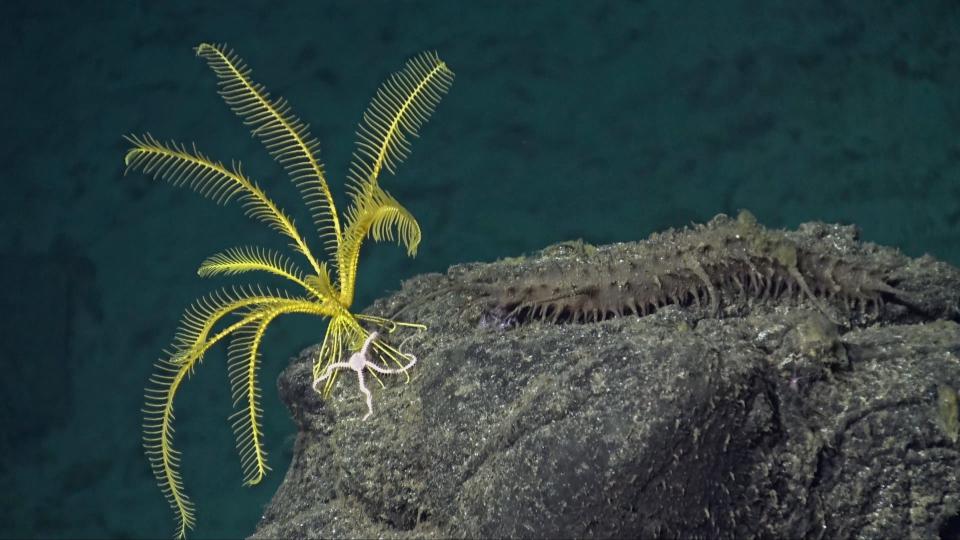Deep-sea mining could help fuel renewable energy. Here's why it's been put on hold.
Industrial-scale deep-sea mining for metals and minerals is on hold for now, after the international group that governs the sea floor could not come to an agreement on a mining code for the ocean bed.
Instead, it announced it would continue working on an agreement aimed at putting regulations governing commercial ocean floor mining in place in 2025.
At stake is a potential bonanza of metals and minerals critical for the transition to a carbon-free global energy system – as well as the pristine and little-understood ecosystem at the bottom of the ocean, which many scientists say could be devastated by disturbances from mining.
The three-week-long contentious meeting took place in Kingston, Jamaica, where the International Seabed Authority had been meeting to hammer out rules and environmental protections. It ended on Friday, July 28.
"The mining code are the rules, regulations and procedures that are going to govern all mining activity if it ever does move forward in the deep sea," said Diva Amon, a marine biologist and director of SpeSeas, an ocean conservation group based in Trinidad and Tobago.
The group's member council, made up of 36 nations, in the end decided more time was needed to finalize the necessary rules. Full-scale mining cannot start until a mining code is agreed upon, although 31 exploratory mining permits have been issued to assess opportunities in specific areas.

The sea floor holds metals and minerals critical for electric vehicles and batteries, but technological and environmental concerns have kept it from being mined.
Now, mining technology has advanced, and some companies believe it can be commercially viable. But conservation issues remain.
Multiple companies and countries are interested in launching mining efforts, putting pressure on the slow-moving United Nations body charged with authorizing and controlling the development of operations in the international seabed.
Mining companies and nations including China, Norway, Mexico, the United Kingdom and the island nation of Nauru had wanted mining to begin as soon as possible, while conservation groups and countries including France, Costa Rica and Chile had called for a moratorium.
This year's meeting had been the first where a pause or moratorium on deep-sea mining had been on ISA's agenda, though in the end it wasn't debated, said Amon.
"China refused to even allow the discussion to take place," she said.
That showed some of the issues with how the Authority works. Something of a backwater for most of the 29 years of its existence, it's now a prominent part of a critical issue, scientists and activists said.
"The need to protect the ocean from the impacts of mining took center stage inside and outside of the ISA during these weeks, despite efforts to silence the debate,” Sofia Tsenikli, global deep-sea mining campaign lead of the Deep Sea Conservation Coalition, said in a release.
Some of the countries and companies looking to mine say exploiting the minerals and metals on the sea floor will be necessary to accomplish the transition to green power on land.
"Something's got to give," said Gerard Barron, CEO of The Metals Company, a Canadian-based company that wants to begin mining the ocean floor.
"We have to find a supply of these important metals that we can inject into the system so we can transition away from hydrocarbons and address the biggest challenge facing this planet, and that's global warming," he said on a call with reporters.
But some economists say the necessary metals and minerals needed are already available on land, it's simply that environmental concerns there make them more expensive.
Other experts contend that newer technologies will make such mining less necessary, such as new types of batteries that wouldn't require difficult-to-source materials such as cobalt.
Meanwhile, seafloor mining opponents say ocean ecosystems are critical to the planet and too little is known about how such mining might impact them to begin industrial-scale efforts.
“The narrative that deep seabed mining is needed to combat climate change is misleading, and simplygreenwashing," said the World Wildlife Fund's Jessica Battle. "A functioning ocean is the best buffer, best mitigation and adaptation tool we have for addressing the impacts of climate change."
The International Seabed Authority will meet again in November and February.
This article originally appeared on USA TODAY: Can deep-sea mining combat climate change? Maybe. Why it's now on hold

